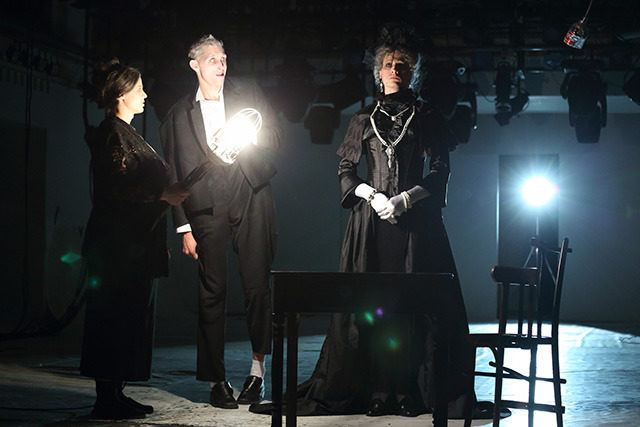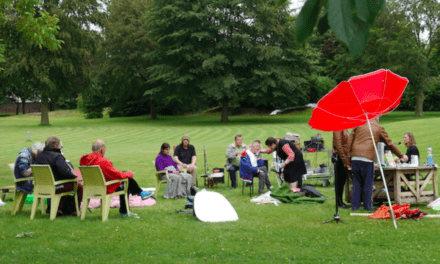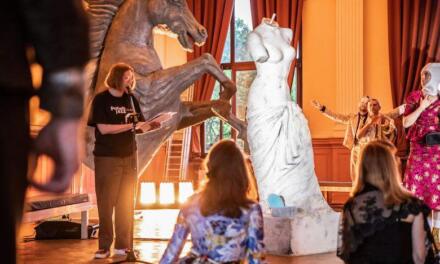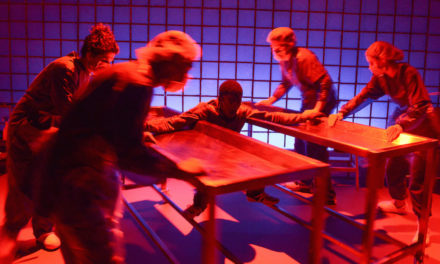On occasion, rather than buried and hidden somewhere, essences lie right there on the surface, just waiting to be seen.
I came out of the School of Dramatic Art last week following the premiere of Dmitry Krymov’s wonderful new production, a bitter, funny take on Alexander Ostrovsky’s Late Love, and I stopped to wait for my wife. As usual, Oksana was coming through the crowd slowly, stopping to talk to friends. She has a lot. In one of my lives I’m a critic. I have a lot less. So I stood by the stage door entrance with time to kill. I looked around to get the lay of the land when my gaze fell on something that – what? surprised me? frightened me? angered me?
I think the word “chagrin” comes closest to what I felt. Because right there before my eyes, hanging on the wall of the guard’s room at the School of Dramatic Art was a portrait of Joseph Stalin. What the hell? I stood there dumbfounded until Oksana arrived with a friend. I pointed it out to them, getting only one of the responses I expected.
Oksana, God bless her, was furious. Her friend, a very good actor, whom we know as a smart, informed, young woman, burst out into laughter. “Oh, that’s hilarious!” she said.
“Hilarious?” I asked.
“Oh, you can’t be serious about that!” she scolded me. “After all, everybody has the right to think what they want. I think that’s hilarious!”
“Wow,” I said. “Wow” was all I could say.
For the record, Oksana, who performs in a couple of Krymov shows, called Krymov’s assistant who called Krymov, who was reportedly livid when he called the theater’s managing director so that, by the time I passed by the theater a few days later, the portrait was gone.
But that image hangs in my mind. As does the sound of our friend suggesting the whole thing was “hilarious.”
As a result I got to thinking about all the similar signs hanging or floating or hiding around me everywhere in Moscow. I know the numbers. One poll insists that 87% of Russians now support President Vladimir Putin since he invaded Ukraine and began instituting more and more laws repressing free speech. In other words, ever since Putin began taking us back closer not just to the Soviet Union, but to Stalin’s Soviet Union, than we have been in decades.
Many important artists, writers and performers have spoken out against this trend. But the truth is that the creative community has split down the middle. I have written a lot in various spaces about those who oppose Putin’s policies. What I have not covered well is the other side, the prominent artists who act as cheerleaders or, at least, apologists, for anything Putin does or says.
And so, just days after my eyes were seared by that portrait of Stalin in one of Moscow’s best theater houses, my attention was drawn to interviews given by two hugely popular and influential Russian actor/directors, one taking extreme care not to offend anyone, the other spitting fire in defense of Vladimir Putin. Both explain to me why a portrait of Stalin might easily show up on the walls of any Moscow theatre.
Vladimir Menshov, whose film Moscow Does Not Believe in Tears won the Oscar as best foreign-language film in 1980 and who continues to cultivate a highly successful career as a television and theater actor, unleashed a tirade against anyone who would dare speak ill of the Soviet Union. The interview was printed Sept. 9 in the notorious, pro-Kremlin newspaper Kultura.
Admitting he “supported dissident conversations” in his youth, Menshov points out that he “began to notice insulting intonations in programs of Radio Liberty and the Voice of America after the Prague Spring.”
Running roughshod over Mikhail Gorbachev and Boris Yeltsin, Menshov suggests that Russia in their years was overwhelmed by “hostile voices” and “banned literature.” “If anyone were to ask a veteran of the dissident movement today, ‘Why did you hate the Soviet regime?’ I would wager you’ll never hear a coherent answer.”
Perhaps Menshov, whether in his dissident-light youth or his memory-challenged senior years, never read Alexander Solzhenitsyn or Varlam Shalamov or Anna Akhmatova’s “Requiem,” about standing in line outside prison walls hoping to get word of her imprisoned son.
Menshov concludes by saying, “Russia’s enemies won’t be allowed to win this war. Ukraine cannot be reborn in the current Russophobic format, and NATO will not dare step in. Eighty percent of this is thanks to the personal efforts of Putin, it’s his crowning hour, his revenge for the losses of the first decade of the 2000s…. History will now change and I think Russia soon will not remain a capitalist state. We must return to the successful economic model which was built in the late Socialist years. It’s the only one that suits our mentality…”
On Sept. 15 the novelist and theater critic Artur Solomonov published an interview with Oleg Tabakov, artistic director of the Moscow Art Theater, in the liberal magazine New Times. It was no bombshell, but it made for some interesting reading, especially between the lines. Throughout the interview Tabakov proves himself to be a master manipulator and maneuverer, never quite attaching himself to the powers that be, but clearly distancing himself from those who would criticize them.
Asked how theater must respond to events now occurring in politics and society, Tabakov responded, “It shouldn’t,” and then describes how attendance has increased during his tenure at the Moscow Art Theater. Asked what he thinks about the schism that has taken place in Russian society, he quotes Chekhov’s Professor Serebryakov and says, “One must do one’s job, people. One must do one’s job,” before explaining how much more Moscow Art Theater actors now earn under his leadership.
Asked what he thought about the criticism opposition-minded people directed at him for supporting Russia’s seizure of Crimea, Tabakov replied that all his male ancestors went to war when called upon, “so how can I have doubts about Crimea?”
“Don’t you think a major war may start?” Solomonov asks.
“No,” Tabakov replies. “I think what happened in Ukraine is our oversight. First, we let 80,000 Banderovists [Ukrainian nationalists who fought with the Germans against the Soviet Army in World War II – JF] out of prison camps shortly after the end of the war. Second is what happened in Ukraine after the collapse of the U.S.S.R. We abandoned them, you know? … We played around with tolerance. We don’t want NATO on our borders do we? No we don’t. Then why were we fooling around? Russia is a powerful nation, and you just wait until the Arctic is ours…”
“You’re an imperialist,” Solomonov teases Tabakov.
“Me? Yes,” Tabakov bites the bait with characteristic bravura.
As the long conversation develops Tabakov repeatedly finds ways to appeal to all sides in the conflicts that history and politics have thrown at contemporary Russian theater artists. He declares he will defy Putin’s new anti-obscenity law, even risking a court case if necessary, by refusing to remove a string of profane words in the Presnyakov’s “Playing the Victim,” which has been playing on the Art Theater’s small stage for well over a decade.
“That’s one of the very rare cases where obscenities are necessary in art,” Tabakov explains. “The Presnyakovs wrote that monologue convincingly and with talent. And I’m leaving that monologue in the show.”
But when asked about the number of political prisoners in Russian prisons, he claims not to know enough to have an opinion. That would require “real study,” he claims. Anyway, he adds, Putin had “no alternative.”
You might see this as a strange, meandering performance only if you lack knowledge and awareness of the way that Russians have played games with power for centuries in order to “do one’s job.” In fact, Tabakov confronts that sticky topic directly. Reminding Solomonov that, as artistic director of a state-funded theater, he is a government employee, Tabakov declares, “once you start working for the government, that’s it. That’s another degree of responsibility and another degree of freedom – there’s nothing to be done about that!”
There is quite a difference between Menshov’s blustery and, frankly, ignorant jingoism, and Tabakov’s careful maneuvering. In fact, Tabakov rails at the notion of “teaching patriotism.” But I find unconvincing and even dangerous Tabakov’s notion that the best way of “doing one’s job” is to avoid asking hard questions, to willingly remain ignorant, and to go with the flow because that’s what one’s ancestors did.
The two views of contemporary Russia offered by Tabakov and Menshov do nothing to erase that image of Stalin that remains before my eyes.
This post was written by the author in their personal capacity.The opinions expressed in this article are the author’s own and do not reflect the view of The Theatre Times, their staff or collaborators.
This post was written by John Freedman.
The views expressed here belong to the author and do not necessarily reflect our views and opinions.


















